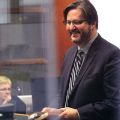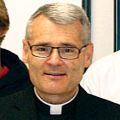MISSISSAUGA, ONT. Singing is faith in action, says Nancy Bodsworth, writer and performer of “Together in Faith,” the theme song for Catholic Education Week 2013.
Our system is rooted in Gospel values
By Noel P. Martin, Catholic Register SpecialTORONTO - In a variety of ways the past year has been a strange one in publicly funded Catholic education. This should not surprise us. We will always be a “sign that will be contradicted” (Luke 2:34). Nothing daunted, we carry on in our mission, confident in our abilities and with a profound reliance on the guiding power of the Holy Spirit. We are a successful, efficient, co-operative school system with an unbroken history going back more than 175 years.
Catholic teachers seek lifting of restraints
By Michael Swan, The Catholic RegisterTORONTO - Ontario’s Catholic teachers are asking provincial Finance Minister Charles Sousa for freedom — freedom from bureaucrats, freedom from standardized tests, freedom to teach all kinds of students from four-year-olds to special needs kids to adult learners.
Port Credit school to reopen as Global Learning Centre
By Evan Boudreau, The Catholic RegisterMISSISSAUGA, ONT. - When the doors of St. James School reopen next September, students will get a global perspective on the world while maintaining a Catholic presence in the community.
For Annaliese Carr, age is no barrier to helping out
By Evan Boudreau, The Catholic RegisterTORONTO - For the second consecutive year Annaleise Carr, the youngest person to successfully swim across Lake Ontario, has been honoured as an Ontario Junior Citizen of the Year.
Keeping faith with past — and future
By Dr. David Sylvester, Catholic Register SpecialLONDON, ONT. - What does it mean to be a Catholic university in this day and age?
Province takes over Windsor-Essex Catholic board
By Catholic Register StaffFor the second time, the provincial government has taken over one of the province's Catholic school boards.
The Windsor-Essex Catholic School Board is the latest to fall under provincial control after an external review found board staff was willing to risk a strike to balance its budget. The board's budget was short $2.2 million this year, the fifth time in the past six years it had failed to balance its books. Staff noted that a strike might help to find those savings.
The board had no contingency plan to find the savings, said Deloitte, the consultants who authored the review.
Norbert Hartmann, who oversaw the Toronto Catholic District School Board when the province took it over in 2008, has been appointed to oversee the Windsor board's financial management and administration.
Barbara Holland, chair of the Windsor board, had predicted a takeover was coming in early August. She told The Catholic Register's Evan Boudreau that it wasn't so much financial instability, but more of a retaliatory measure for the board filing for conciliation to resolve the collective bargaining difficulties it was having with its teachers (before the province introduced its Putting Students First legislation Aug. 27).
"I do feel that it is a retaliatory measure and it is retaliation because we spoke out on this issue," said Holland.
Catholic trustees bound to earlier deal, not new legislation
By Evan Boudreau, The Catholic RegisterTORONTO - The devil is in the details as far as Catholic school boards are concerned when it comes to side-stepping strikes and lockouts.
The Putting Students First Act, the Liberal government’s legislation to freeze teacher salaries, will require Catholic schools to operate by a different, more restrictive, set of rules than the province’s public boards. And that has the Ontario Catholic School Trustees’ Association (OCSTA) up in arms.
Catholic boards will continue to be bound by the deal struck in July between the Ontario English Catholic Teachers’ Association (OECTA) and the Ministry of Education, even though the government legislation has backtracked on some key provisions contained in that agreement.
To get the Conservatives on side with Putting Students First, Dalton McGuinty’s Liberals had to remove controversial clauses that would have stripped school boards of some rights related to the hiring of permanent teachers and managerial oversight of diagnostic testing. Public boards will now be able to negotiate locally with teachers on those contentious issues, while the trustees from Ontario’s 29 Catholic boards are stuck with the deal the government negotiated with OECTA.
“The effect of these changes are in fact no change at all,” said Bob Murray, the OCSTA’s director of legislative and political affairs. “It’s subverting the role of trustees.”
The OECTA deal leaves virtually no room for local collective bargaining because all the substantive issues were settled without input from the province’s trustees.
“Under the proposed legislation no local collective bargaining will happen,” Murray said. “It’s an agreement that local trustees never agreed to.”
On July 4, following six months of unsuccessful bargaining, the Catholic trustees walked away from the table. That left the government and OECTA to strike a deal that imposed a two-year wage freeze, a reduction in sick days from 20 to 10, and elimination of the right to bank sick days until retirement. But the deal also gave the union greater input in hiring permanent teachers and some control over diagnostic testing.
“We said from the beginning that Ontario has a problem fiscally and something had to be done and we were willing to help out,” said Marino Gazzola, president of OCSTA.
“I think our concerns are the same now as they were before any proposed changes.”
He said that in negotiations with the government, OCSTA has consistently opposed ceding rights to the union on the issues of hiring and diagnostic testing. He said it’s not for him to say if the Liberals finally changed their position due to pressure from the Conservatives.
“If I had the answer to that I would probably be a millionaire,” he said. “We’ve been voicing these concerns all along and we’ve been firm in our position and we’ve been strong and consistent in our position.”
Those concerns were that provisions surrounding the hiring practices and diagnostic testing removed managerial rights and significant checks and balances from the boards. Under the changes, the trustees believe hiring now gives seniority greater weight than overall qualification, while granting teachers control of diagnostic testing gives them the ability to hide under-performing students.
“All students in Ontario should be able to receive an education from the most qualified teachers and benefit from the insight gained from the use of system-wide diagnostic tests that include parents,” said Gazzola. “School boards in this province have serious concerns about the proposed legislation.”
OCSTA was surprised to learn that the amendments to Putting Students First would not apply to the Catholic boards. They are now calling for additional revisions to essentially veto the controversial areas of the OECTA agreement so that Catholic boards have the same ability as public boards to negotiate locally with teacher unions.
“This legislation will create inequity in our system,” said Gazzola. “We urgently call on your government to amend the legislation to honestly reflect the changes proposed by the opposition.”
School, parish, family come together to form a Catholic community
By John B. Kostoff, Catholic Register SpecialCatholic schools exist to assist committed families and their parishes celebrate and live their faith in our communities. But people sometimes say this triad of school, church and family is no longer functional. Yes, it can be challenging to keep all the partners working in harmony, but it is a challenge we must never abandon because the result of failure is a weakening of our faith community.
When examining the early Church and how Jesus lived with His disciples we find six consistent elements of their life together. They were welcoming, celebrating, learning, reconciling, serving and praying with each other and the larger community. We must seek the same things in our parish-school relationships.
There are many teachers, parents and priests working to make this relationship more meaningful. It is a task the entire Catholic community must embrace if it is to achieve continuous improvement of our schools. At Vatican II, the Church shifted its emphasis from institution to community. Its Declaration on Education said a “Catholic school is distinguished by an attempt to build community, permeated by the Gospel spirit of freedom and love.” But this concept of community should never be truncated to just the local school. It must include the larger concept of community, embracing the parish, the school and the family. We cannot think of our Catholic community without recognizing that a community only exists if it includes all three of these pillars.
Building this community requires hard work and common sense. First, it obligates us to see the importance of this relationship and strive to make it work. It means abandoning traditional ways of doing things and not imposing our will on others (“thy will be done,” not my will be done.)
Second, let’s recognize our strength when we work together, acknowledging each other’s importance but not exclusive right. It is precisely because we form a partnership that we should be freed from the egoism and self-centred and controlling ways that often mark the secular world.
Finally, we need to seek opportunities to illustrate this partnership to students, teachers and parishioners. Our community must see the concrete ways this relationship can be made viable and enriching for all. We become stronger as a Catholic community when we give words to what we profess. But we must be mindful that this relationship is often fractured when adult concerns are imposed on our schools and when we ignore the unique role filled by Catholic schools.
The need for parish, school and home to work together has never been greater. Below are suggestions to help achieve that goal:
-
o At registration, principals should invite the parish priest to help greet new parents. There should be a letter of welcome from the pastor as well as the principal, and recognition that registration is an opportunity to demonstrate to parents the importance of co-operation between parish, school and home.
-
o Meetings are a reality of modern life so make them productive. The local priest should be invited to address the faculty at one of their first meetings and the principal should be invited to speak to the Knights of Columbus, Catholic Women’s League or the parish council. Principals and pastors should meet quarterly, possibly over lunch or breakfast.
-
o Schools should be unwavering advocates for the parish and likewise the parish for its Catholic schools.
-
o While there may be issues of a larger nature confronting the school system or Church, work at improving one parish and one school at a time.
-
o Building relationships is essential, so even in large parishes one priest should be designated as the contact for each school and, likewise, the principal should be the main contact with the parish, not a chaplain, other school administrator or teacher.
-
o The parish bulletin should provide space each month for information about what is occurring in schools from a religious perspective, and the school newsletter should provide space for the pastor to provide information about the liturgical cycle, upcoming feast days, prayers, etc.
-
o Schools and parishes should work together on holding missions or retreat days that can include a talk by the local priest, student involvement and community prayer and fellowship.
-
o Create a pastoral plan in September that outlines events that the parish and school will do jointly and publish the calendar in the parish and school bulletins.
-
o Parishes should provide a bulletin board for schools to show off student achievements and share school news, and schools should do likewise for parishes to promote church events.
-
o All school newsletters should contain the parish Masses and organizations and all parish bulletins should contain school information.
-
o In the event of significant curriculum changes, school officials should discuss them with the priest, just as the priest should discuss with principals any new approaches to the celebration of the sacraments.
-
o Link parish youth ministers with the local school and work together on events and ministry.
-
o Priests should regularly proclaim from the pulpit the value of Catholic education, and become regular visitors to secondary schools. The local priest should not be a stranger to the community.
-
o School councils should have a parish rep to facilitate two-way communication, keeping the pastor informed on school matters and the school informed on parish issues.
-
o Vocation days or vocation weeks should be a hallmark of our schools. Schools should have a vocation plan beginning in elementary school that stresses lay vocations and the vocation to religious life.
-
o Schools should encourage faculty after-school retreats as a way for staff to link to the local parish and engage in prayer, socializing and sharing a common mission.
-
o Schools should consider holding drop-in Fridays, where a parish priest can drop by as school is dismissing to talk to staff. No agenda, just coffee, treats and dialogue between the staff and the priest.
-
o Involve the local school trustees by inviting them to meet with the Knights of Columbus and Catholic Women’s League, address the parish after Mass or speak at schools on an information night.
-
o The pastor and the principal should be on each other’s speed dial.
People looking for perfection in our Catholic homes, schools and churches will be horribly disappointed. They all are populated with struggling people. So make a list of complaints if you must, but then tear it up, because there is already too much to do and so much at stake.
(John B. Kostoff is the Director of Education for the Dufferin-Peel Catholic District School Board and the author of Auditing Our Schools.)
Basilian curriculum focuses on the Catholic in Catholic education
By Evan Boudreau, The Catholic RegisterTORONTO - The Basilian Fathers are working on a professional development curriculum for teachers that will focus on the distinctiveness of Catholic education.
“We are moving from being the teacher of the students to the teacher of the teachers,” said Fr. George Smith, C.S.B., who pitched the new curriculum at a Basilian conference held last March. “It’s easier for us to be the teachers of the teachers because there are fewer of them (than students).”
Using contemporary adult eduction techniques, which Smith described as “animation and facilitation,” the course aims to re-evangelize teachers, including those in administrative positions.
“We want to bring teachers together to explain what they do. Hear what is distinct about the school that we teach in,” said Smith. “It’s about empowering teachers to stand up and say ‘I’m a teacher in a Catholic school and here is why.’ ”
Expected to be ready for the fall of 2013, the curriculum will first appear in North America’s three Basilian-owned high schools: Toronto’s St. Michael’s College School, St. Thomas High School in Texas and Catholic Central High School in Detroit.
The curriculum will be explained to staff by two Basilian Fathers who will facilitate the program. They will be among 10 to be selected for the role during a Basilian conference in Houston in December.
During the professional development days, the Basilian facilitators will offer their opinion of what a Catholic education should be. The aim is to have teachers re-energized about their faith, which Smith said has become “lukewarm” for most.
In the paper he presented in January, Smith blamed advances in social communications, scientific and technical research, problems of globalization, new and emerging political, economic and religious forces and secularization for weakening the faith among teachers. By reigniting the teachers’ faith, Smith hopes to see a trickle-down effect throughout schools.
“I really see this as a wonderful example of the New Evangelization,” said Smith. “We’re trying to create an environment where children feel as if they’re in a community of faith.”
Although only Basilian schools will be offered this service at first, the intention is to make it available to publicly funded Catholic schools in the long run.
“When I look five years down the road I would like to see this (curriculum introduced) into areas with socio-economic challenges,” said Smith, calling this a preservation of the Basilian roots of educating the impoverished.
But this is about more than preserving Basilian ideologies, said Smith, referring to the “educational emergency” of a Catholic school system that is growing weaker in the faith, a topic Pope Benedict XVI has often discussed.
“We are convinced that if our teachers don’t know why Catholic education is distinctive, then Catholic education will disappear in this country within a generation,” said Smith, adding that it’s the Catholic system’s attention to values which sets it apart.
Advisory council empowers students to empower students
By Erin Morawetz, The Catholic RegisterTORONTO - Ontario’s Student Advisory Council, which brings together students from all over Ontario, is lively, full of discussion and debate.
The council, a yearly initiative created in 2009 by the Ministry of Education, consists of 60 students in all sectors of the education system, including Catholic boards. The students participate in discussions, team-building and leadership activities, as well as identify issues within their schools and offer suggestions for positive change.
Gary Wheeler, senior media relations co-ordinator at the Ministry of Education, said the purpose of the council is for members to share their ideas and advice with the Minister of Education on how to ensure Ontario’s schools remain “the best in the world.”
“The council is about empowering you to ‘be the change,’ ” Wheeler said in an e-mail. “It is an opportunity to think big, SpeakUp (programs to engage students academically and socially) and take action to help other students across the province.”
Ben O’Neil, now a Grade 10 student from the Ottawa Carleton Catholic School Board, says he didn’t necessarily find Catholic students were equally represented on the council, but that it didn’t really matter.
“It was students from every board, every different place from Barrie to London, North Bay, Ottawa, Thunder Bay, Toronto,” O’Neil said. “It shows you that no matter what school it is, Catholic, public … we are all students, we are all equals.”
O’Neil applied to be on the council for the one-year term through the encouragement of a friend. The council met for the first time in May of this year, and met again in August before the school year begins after Labour Day.
O’Neil says meeting with different students from all over the province was an eye-opening experience.
“It’s interesting to see that there are those similarities, those basics,” O’Neil explains. “Every school has bullying. We have more faith-based groups, but it’s interesting to share ideas.”
For Alicia Pinelli, a graduating student who represented the Niagara board, being on the council has been an “amazing experience.”
“It seemed that the Catholic students all kind of gravitated (to talk about) things that weren’t common in our schools, weren’t open in our schools,” Pinelli said. “The public schools are more open to a lot of different things. It was a good experience to see how the two interacted, how the two could change each other.”
But not everyone thought all the discussions were particularly productive.
Enrique Olivo, an incoming Grade 11 student from the Toronto Catholic District School Board, felt a bit of a backlash towards Catholic schools, especially when discussing the issue of Gay-Straight Alliances.
“(No one wanted) to say anything controversial,” Olivo said. “At times you could feel the tension.”
Still, Olivo, who will also act as treasurer of his school’s student council this year, thinks the advisory council does good work.
“We covered a whole bunch of issues: dealing with mental health problems and how schools should focus on that, technology in the school, a little bit about equality amongst races, sexual orientation.
“The council will definitely make a lot of changes.”












